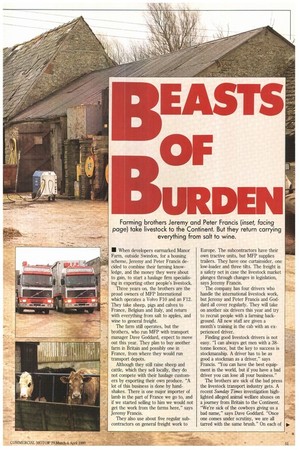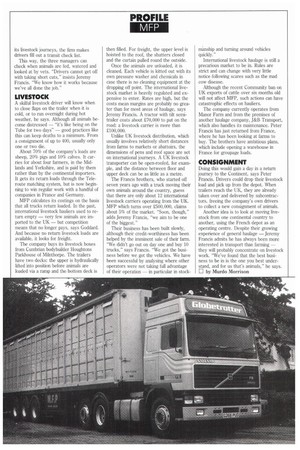EASTS OF
Page 77

Page 78

If you've noticed an error in this article please click here to report it so we can fix it.
URDEN
Farming brothers Jeremy and Peter Francis (inset, facing page) take livestock to the Continent. But they return carrying everything from salt to wine.
• When developers earmarked Manor Farm, outside Swindon, for a housing scheme, Jeremy and Peter Francis decided to combine their farming knowledge, and the money they were about to gain, to start a haulage firm specialising in exporting other people's livestock.
Three years on, the brothers are the proud owners of MFP International which operates a Volvo F10 and an F12. They take sheep, pigs and calves to France, Belgium and Italy, and return with everything from salt to apples, and wine to general freight.
The farm still operates, but the brothers, who run MFP with transport manager Dave Goddard, expect to move out this year. They plan to buy another farm in Britain and possibly one in France, from where they would run transport depots.
Although they still raise sheep and cattle, which they sell locally, they do not compete with their haulage customers by exporting their own produce. "A lot of this business is done by handshakes. There is one major importer of lamb in the part of France we go to, and if we started selling to him we would not get the work from the farms here," says Jeremy Francis.
They also use about five regular subcontractors on general freight work to Europe. The subcontractors have their own tractive units, but MFP supplies trailers. They have one curtainsider, one low-loader and three tilts. The freight is a safety net in case the livestock market :li*.e.. plunges through changes in legislation, says Jeremy Francis.
The company has four drivers who handle the international livestock work, but Jeremy and Peter Francis and Goddard all cover regularly. They will take on another six drivers this year and try to recruit people with a fanning background. All new staff are given a month's training in the cab with an experienced driver.
Finding good livestock drivers is not easy. "I can always get men with a 38tonne licence, but the key to success is stockmanship. A driver has to be as good a stockman as a driver," says Francis. "You can have the best equipment in the world, but if you have a bad driver you can lose all your business."
The brothers are sick of the bad press the livestock transport industry gets. A recent Sunday Times investigation highlighted alleged animal welfare abuses on a journey from Britain to the Continent. "We're sick of the cowboys giving us a bad name," says Dave Goddard. "Once one comes under scrutiny, we are all tarred with the same brush," On each of
its livestock journeys, the firrn makes drivers fill out a transit check list.
This way, the three managers can check when animals are fed, watered and looked at by vets. "Drivers cannot get off with taking short cuts," insists Jeremy Francis. "We know how it works because we've all done the job."
LIVESTOCK
A skilful livestock driver will know when to close flaps on the trailer when it is cold, or to run overnight during hot weather, he says. Although all animals become distressed — "it's like being on the Tube for two days" — good practices like this can keep deaths to a minimum. From a consignment of up to 400, usually only one or two die.
About 70% of the company's loads are sheep, 20% pigs and 10% calves. It carries for about four farmers, in the Midlands and Yorkshire, and is paid by them rather than by the continental importers. It gets its return loads through the Teleroute matching system, but is now beginning to win regular work with a handful of companies in France and Germany.
MFP calculates its costings on the basis that all trucks return loaded. In the past, international livestock hauliers used to return empty — very few animals are imported to the UK — but competition means that no longer pays, says Goddard. And because no return livestock loads are available, it looks for freight.
The company buys its livestock boxes from Cumbrian bodybuilder Houghtons Parldiouse of Milnthorpe. The trailers have two decks: the upper is hydraulically lifted into position before animals are loaded via a ramp and the bottom deck is then filled. For freight, the upper level is hoisted to the roof, the shutters closed and the curtain pulled round the outside.
Once the animals are unloaded, it is cleaned. Each vehicle is kitted out with its own pressure washer and chemicals in case there is no cleaning equipment at the dropping off point. The international livestock market is heavily regulated and expensive to enter. Rates are high, but the costs mean margins are probably no greater than for most areas of haulage, says Jeremy Francis. A tractor with tilt semitrailer costs about 270,000 to put on the road: a livestock carrier is more than £100,000.
Unlike UK livestock distribution, which usually involves relatively short distances from farms to markets or abattoirs, the dimensions of pens and roof space are set on international journeys. A UK livestock transporter can be open-roofed, for example, and the distance between floor and upper deck can be as little as a metre.
The Francis brothers, who started off seven years ago with a truck moving their own animals around the country, guess that there are only about 12 international livestock carriers operating from the UK. MFP which turns over £500,000, claims about 5% of the market. "Soon, though," adds Jeremy Francis, "we aim to be one of the biggest."
Their business has been built slowly, although their credit-worthiness has been helped by the imminent sale of their farm. "We didn't go out on day one and buy 10 trucks," says Francis. "We got the business before we got the vehicles. We have been successful by analysing where other operators were not taking full advantage of their operation — in particular in stock manship and turning around vehicles quickly."
International livestock haulage is still a precarious market to be in. Rules are strict and can change with very little notice following scares such as the mad cow disease.
Although the recent Community ban on UK exports of cattle over six months old will not affect MFP, such actions can have catastrophic effects on hauliers.
The company currently operates from Manor Farm and from the premises of another haulage company, J&B Transport, which also handles its maintenance. Peter Francis has just returned from France, where he has been looking at farms to buy. The brothers have ambitious plans, which include opening a warehouse in France for groupage loads.
CONSIGNMENT
Doing this would gain a day in a return journey to the Continent, says Peter Francis. Drivers could drop their livestock load and pick up from the depot. When trailers reach the UK, they are already taken over and delivered by subcontractors, freeing the company's own drivers to collect a new consignment of animals.
Another idea is to look at moving livestock from one continental country to another, using the French depot as an operating centre. Despite their growing experience of general haulage —Jeremy Francis admits he has always been more interested in transport than farming — they will probably concentrate on livestock work. "We've found that the best business to be in is the one you best understand, and for us that's animals," he says. 0 by Murdo Morrison




































































































































































